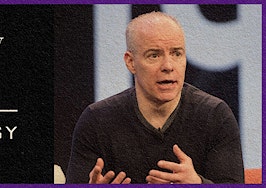EVENT UPDATE: Ryan Gorman, president and CEO at Realogy subsidiary NRT, will take the stage at Inman Connect New York, Jan. 28-31. Discover the future at ICNY. Click here to learn more …
Ryan Gorman is keeping busy.
Though only just now wrapping up his second year as the president and CEO of Realogy subsidiary NRT, he’s also weeks away from taking over the leadership at Coldwell Banker as well. In his new role, Gorman will oversee a version of Coldwell Banker that brings together for the first time both the company-owned and franchise iterations of the brand. So yeah, he has a few things on his plate right now.
Gorman’s leadership roles — he’s worked in various other executive positions at Realogy since 2007 — also give him an ideal vantage point to watch the broader industry. To get his take on the state of the real estate business, Inman recently chatted with Gorman about everything from pocket listings to venture capital. What follows is a version of that conversation that has been edited for length and clarity.
Inman: You’ve said that 2019 was dominated by a focus on the latest shiny object. Can you elaborate on that? Are there any examples that come to mind?
Gorman: I think when it comes to technology — specific technology or tools or new companies — there were a lot of huge promises leading up to 2019 and in 2019. Candidly, what consumers and agents and brokers are probably tired of now is unfulfilled promises largely from some, kind of, pseudo technology companies.
I think the best sort of widely understood example is the debunking of the WeWork alternative reality. I think in 2019 you kind of reached the point of exhaustion with over-promise and under-delivery. And I feel like there’s been a real flight to quality and a return to reality that is going to characterize 2020.
You mentioned WeWork example and “pseudo technology companies.” I can’t help wonder if you’re also sort of implicating Compass because they’re also funded by SoftBank, and because some say they’re taking an existing model and applying the technology label. Is that who you had in mind?
Among others. There’s certainly no shortage of very apt comparisons between WeWork and Compass. But there are others as well who made claims whose results maybe were not supported. And I think that’s where the market really reached a point of fatigue in 2019.
In 2020, I think the next person who enters with a too-good-to-be true promise — we’re going to check references. We’re going to ask people who have experienced that service, or that product, whether or not it really delivered on the promise to grow business.
So I don’t think that’s the only example, but I do think it’s an apt example.
Any others come to mind?
For consumers, I think there are many. I think there are a lot of consumers who turn to discount brokerage models, online models, models that operate outside the MLS and purport to save consumers money on commissions in some way. Even iBuyer models.
And I think what consumers need to ask themselves, and increasingly are asking themselves, is whether or not they’re actually saving money with these approaches.
What do you think of the role of venture capital and the massive funding that has poured into the industry. Are we going to see fewer SoftBanks investing in real estate in the future?
I think there’s a return to sanity in the venture capital space. I would say that venture capital has historically played the role of an enabler, allowing good ideas to take on incumbent industries. I think there’s a lot of value in that. It’s admirable.
Where I think we perhaps lost our way a little bit was when we moved past disruption and into destruction. When venture capital became weaponized and the goal was to use massive sums of money to destroy competitors, as opposed to better servicing the consumer. I hope that was a temporary phenomenon and sanity is returning to the world.
Long term, unsustainable business models fail.
The venture capital market in and of itself appears to be correcting more rapidly, candidly, than I anticipated. SoftBank being the best example.
You mentioned players who operate outside the MLS, which brings to mind the pocket listing debate and the new National Association of Realtors policy. What do you make of these developments?
I think all of these debates are productive when they’re focused on what’s the right thing to do for the consumer. Which in this case is homeowners as well as homebuyers. So when we think we can begin marketing a home prior to, for instance, all fields in an MLS being completed or when we can start making the market aware of a home coming soon — maybe a day or so in advance — I think that can make the market more efficient. It can ensure that eager buyers can find out about opportunities in a timely way. And it can ensure that sellers are able to get their home off the market in a little bit less time and possibly for a better price.
So I think that’s tremendously efficient.
There are other consumers who really strongly prefer not to market their home in that way. I think privacy concerns prevail. And we should obviously honor, to the extent we can and as permitted by law, their request. Those two are somewhat separate from the more extreme examples of pocket listings that often times dominate these debates.
And in terms of the policy that we’re left with now, what do you think of the way things have actually played out?
I think there was healthy debate. Perhaps incomplete at times. But healthy debate that resulted in a National Association of Realtors policy that feels largely fair and equitable. Regardless of what the ideal policy may or may not have been, it feels like where NAR has pushed the industry is toward a relatively level playing field that prioritizes exposure of listings for all consumers.
Shifting to consumers, you’ve also mentioned the idea of a “skinny bundle,” or the notion that we may see brokerages offering different tiers of service in the future. What does that mean?
Most new market entrants in almost any industry are found in the sort of discount arena where they’re communicating on price but not necessarily on value. It’s the easiest thing to communicate massively and broadly, so it’s natural that that’s where they come in.
I think that is true in our space. It will continue to be true in our space but I think it’s a bit of a false choice. Because I think that those who offer value, and not just price, can really deliver that value if they communicate it well.
Some of what we’re doing with RealSure and RealVitalize from Coldwell Banker is bringing additional services to the consumer that allow them to opt into additional value — which augments and goes beyond the role of trusted advisor.
And I think you’re going to see that more and more.
I think in our space as consumers come to expect and demand more, they’re going to be able to work with full service advisors who can bring additional features to a transaction.
Do you think the majority of consumers will go for that full service, added-value model? Or do you think a significant number will be led away by discount options?
I do think the vast, vast majority will continue to choose full value as long as that value gets better every day. And as long as the providers of that value can communicate it.
If you look since our founding, the service that an agent brings to a consumer has changed pretty dramatically over that hundred-plus year history. And it’s because of this sort of entrepreneurial spirit not just with Coldwell Banker, but with our agents and affiliates as well.
I think that is what has allowed the numbers we see today that have defied every prediction in terms of how many consumers would use an agent in the future. Once listings could go online, the predictions were that consumers would stop using agents. In fact, it’s gone the reverse direction. Once you could quickly find legal forms online, the predictions were that people would stop using attorneys. In fact, I think we probably have more attorneys now than we ever had in history.
These are the kinds of things that keep defying expectations. Not because consumers don’t want or demand more, but because industries keep delivering more for the same value that they’ve delivered in the past.
Create your own success story at Inman Connect New York, Jan. 28-31, where over 4,000 industry professionals gather to forge new relationships, share tactical takeaways and discover the latest technology to boost their bottom line.
Thinking of bringing your team? There are special onsite perks and discounts when you buy tickets together. Contact us to find out more.










